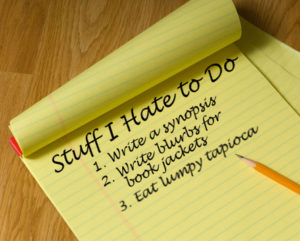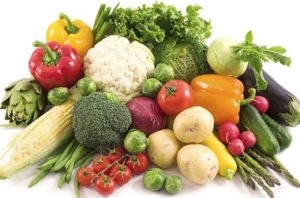 Writing a synopsis sits high on my Stuff I Hate To Do list. It’s up there with writing blurbs for book jackets. Bleh. Ask me to craft a scene that draws a reader in, that sets you on the edge of your chair, that makes you feel something, and I’m in. Love the challenge. But don’t ask me to narrow a plot down to the basics and spoil the ending.
Writing a synopsis sits high on my Stuff I Hate To Do list. It’s up there with writing blurbs for book jackets. Bleh. Ask me to craft a scene that draws a reader in, that sets you on the edge of your chair, that makes you feel something, and I’m in. Love the challenge. But don’t ask me to narrow a plot down to the basics and spoil the ending.
Synopses are spoilers. Nobody wants a spoiler, right?
Wrong. Agents want them. Editors want them. All the publishing pros want them. A synopsis tells them who’s who and what’s going down and whether the protagonist manages to get what she wants, and how she thwarts the antagonist, and… yeah. You have to reveal all of it, including the neat twist you thought up for the ending. Spoil away.
This month I wrote a synopsis of my work-in-progress because next month I’m attending a writers’ conference and I need a succinct summary of what I’ve been working on. So I fussed and gritted my teeth and got it done—single spaced and less than one page, thank you—and I set it aside.
Then a funny thing happened. When I returned to my manuscript’s muddy middle—to a chapter I’ve been struggling to revise—the purpose of the scene became clear. The synopsis laid it out for me: the protagonist desperately wants this, but so-and-so is in the way, and his plan for jumping that hurdle takes him… You get it. I moved some dialogue to a later chapter and focused on what the protagonist has to accomplish at this point in the story. His actions spring from his motivations.
Now I’m on to the next chapter, and having the synopsis in front of me is a huge help. I’m revising a complete first draft (maybe it’s the fifth draft—I’ve lost count—but it is complete), and that helps, too. While some novelists work from outlines, I’m not one of them. I had to write my way to the end in order to fully understand the characters and the story’s dramatic arc. Knowing the ending, I can now see the characters moving toward it, and can kill all sorts of darlings that have drifted in and don’t belong.

I mentioned to good friend and colleague Robin Farmer that I hated having to write a synopsis, but I’d made myself do it, and found it surprisingly helpful. She didn’t bat an eye. “Oh, yeah,” she said, “you have to eat your vegetables.” Actually, I think she said, “damn vegetables.” Yeah.
Lots of websites tell you how to write a synopsis. I recommend this one by Jane Friedman. Forget the subplots and lesser characters, and boil the story down to the protagonist’s desire and the main obstacle in the way. To the stakes and how they get raised. The yearning. The climactic scene. Then tell the ending. Just do it. And once you have your synopsis in hand, follow it like a blueprint and watch how healthy your novel becomes.

Thanks, Anne. I get it. Sorry I missed the panel at B&N yesterday. Allergies brought me lethargy and headache. Yes, I like Jane Friedman’s blog. She is a good source for writers.
It would’ve been fun to see you at B&N! But no worries. I’m sure I’ll see you soon, what with all the writerly events going on through the fall. Sorry about those allergies. Richmond is a killer, isn’t it? I cued into Jane Friedman’s platform when she first came to a James River Writers conference, and that was many years ago–maybe ten or more? Hard to believe this year is JRW’s 15th annual conference. I love how Richmond’s writing community has grown over the past 15 years. Need to catch up on what you’re writing now.
Sounds like me, Tanya Toliet Tongue 🙂
Oh, yes! You called it, Robin. And you gave me a decent title for this month’s blog.
I’m one of those strange people who doesn’t fear writing a synopsis. While I consider myself a pantser, I’m a bit of a plotter at heart, so about halfway through the book I write the synopsis as an alternative to an outline. The outline seems so cold and technical (maybe because I started out writing nonfiction) but with the synopsis I feel I can let my characters wreak havoc. It’s always fun to get to the end and see how much the final result matched the synopsis.
It’s one of my least favorite things to do. But I agree that a synopsis is helpful to have.
Hi, L. Marie! Good to hear from you.
Lyn – I agree that a synopsis is nowhere near as cold and technical as an outline. Done well, it has a lot of heart — THE heart, the emotional arc of the story. Maybe now that I’ve found this synopsis so helpful, I’ll try writing the next one as soon as I finish a first draft.
Thanks, Anne. This is a good reminder that many find writing a synopsis as painful as I do.
Painful, yep. And they’re hard to write. Of course, fiction is hard to write, too, but at least the end result (when well written) is rewarding to read.